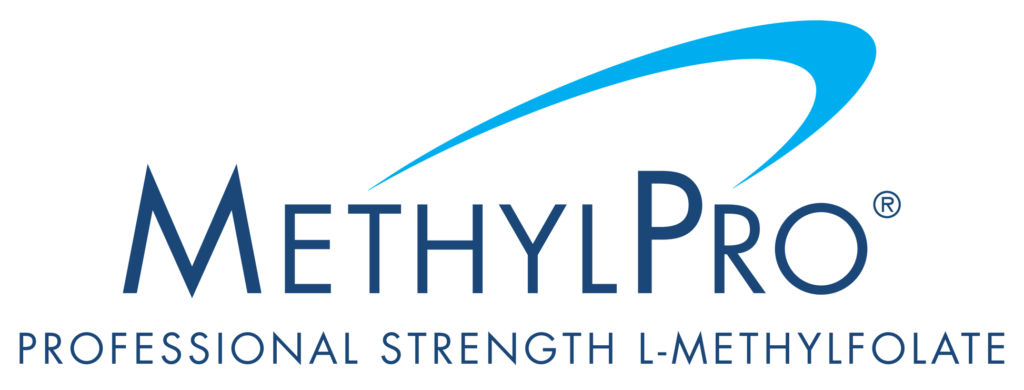If you’re curious about who could benefit from an L-methylfolate supplement, the answer is probably more widespread than you think.
As a health-conscious individual, you likely know that folate is a crucial B vitamin, essential for numerous bodily functions. You may also know that folate deficiency can lead to a variety of serious health issues. However, a low folate status is often easy to miss. This is especially true when we only look at the quantity of folate in the diet. We need to look at the form of folate, or what is actually absorbed, activated, and circulated.
In this article, we’ll explore the symptoms of a low folate status. We address the reasons you might be folate insufficient, and how a folate supplement can improve your overall well-being.
Understanding Folate and Folate Insufficiency
Folate, also known as vitamin B9, must be in its active form, L-methylfolate, to perform its essential roles in DNA synthesis, repair, methylation, red blood cell formation, and proper brain function. Typically low folate levels occur due to genetic factors that affect folate metabolism, poor dietary intake, and certain medical conditions.
L-Methylfolate is the activated, useful form of folate in the human body. If the form of folate you are consuming is what’s naturally found in food, or folic acid-fortified foods, you must produce an enzyme to convert it to L-methylfolate before it can be used. Supplementary L-methylfolate, on the other hand, can be used immediately upon absorption. It does not require conversion.
Recently, concerns have risen over the buildup of unmetabolized folic acid (UMFA). This happens when individuals supplement with folic acid instead of l-methylfolate. UMFA is an issue because it can mask the lack of other essential vitamins. It can cause functional folate insufficiency, even if the levels of folate consumed appear to be adequate [1].
Are You Getting Enough Folate?
Several factors can contribute to folate insufficiency, making it important to identify and address the root causes:
- Poor Diet: A diet low in leafy greens, legumes, and fortified foods can lead to inadequate folate intake.
- Certain Medications: Drugs such as anticonvulsants, methotrexate, and some antacids can interfere with folate absorption or metabolism [2,3].
- Medical Conditions: Excessive alcohol consumption and conditions affecting absorption in the gut or bowels can all contribute to impaired folate uptake [4].
- Increased Need: Pregnancy, lactation, and periods of rapid growth increase the body’s demand for folate. Demand can surpass your dietary intake that has been adequate in the past [5].
- Genetic Factors: Many individuals have a genetic mutation in the MTHFR gene, affecting their ability to convert folic acid into its active form, L-methylfolate. This means, that even when an appropriate amount of folate is being consumed, the levels of usable L-methylfolate in the circulation are still too low [6]. If you experience symptoms of folate deficiency but consume folic acid daily, this genetic issue is one worth exploring.
How an L-Methylfolate Supplement Can Improve Your Well-being
L-methylfolate is the bioactive form of folate, meaning it’s readily used by the body without the need for conversion. This makes it particularly beneficial for individuals with genetic mutations affecting folate metabolism. Here’s how an L-methylfolate supplement can help:
- Enhanced Energy Levels: By supporting red blood cell production and mitochondrial function, L-methylfolate can help alleviate fatigue and boost overall energy levels [7].
- Improved Mood and Cognitive Function: Adequate folate levels are essential for neurotransmitter synthesis, which can improve mood and enhance cognitive function [7].
- Digestive Health: Addressing folate deficiency can improve digestive symptoms, promoting better overall digestive health [8].
- Support During Pregnancy: L-methylfolate is crucial for the proper development of the fetal neural tube in early stages of pregnancy, making it an important supplement for pregnant women or those planning to conceive. Supplementing with L-methylfolate, as opposed to folic acid, can prevent a build-up of unmetabolized folate, which is believed to pose some health risks [5].
- Cardiovascular Health: Folate helps regulate homocysteine levels, an amino acid linked to heart issues when elevated [9]. L-methylfolate supplementation can thus support cardiovascular health.
Who Should Consider an L-Methylfolate Supplement?
While anyone with symptoms of folate deficiency can benefit from supplementation, certain groups are at higher risk and should consider an L-methylfolate supplement:
- Individuals with MTHFR Gene Mutations: Those with genetic mutations affecting folate metabolism can benefit significantly from L-methylfolate, as it bypasses the need for conversion [5]. To read more about MTHFR and L-methylfolate, click here.
- Pregnant and Lactating Women: Due to increased folate requirements, supplementation is crucial to support fetal development and maternal health [5]. L-Methylfolate is a highly bioavailable choice of folate supplement, regardless of your genetic makeup.
- People with Certain Medical Conditions: Those with conditions affecting nutrient absorption can benefit from an L-methylfolate supplement due to its superior bioavailability [10].
- Individuals on Certain Medications: If you’re taking medications that interfere with folate absorption or metabolism, supplementation can help to balance these issues and maintain adequate folate levels [11]. Be sure to discuss dosing with your doctor.
- Older Adults: Aging can affect nutrient absorption and increase the risk of deficiency, making supplementation beneficial for maintaining adequate L-methylfolate levels in the circulation [12].
Final Thoughts
Folate is an essential nutrient with wide-ranging benefits for overall health. If you’re experiencing symptoms of low folate or belong to a high-risk group, a high-quality L-methylfolate supplement could be the key to improving your well-being. As always, consult with a healthcare professional before starting any new supplement regimen to ensure it aligns with your individual health needs and goals.
References
- https://www.ncbi.nlm.nih.gov/pmc/articles/PMC10318921/
- https://www.njmonline.nl/getpdf.php?t=i&id=234#page=13
- https://www.epilepsybehavior.com/article/S1525-5050(20)30515-1/abstract
- https://journals.lww.com/mjmr/fulltext/2022/13010/a_cross_sectional_study_of_serum_b12_and_folate.4.aspx
- https://www.sciencedirect.com/science/article/abs/pii/S0301211520303754
- https://www.scirp.org/journal/paperinformation?paperid=111697
- https://journals.healio.com/doi/abs/10.3928/02793695-20170619-02
- https://onlinelibrary.wiley.com/doi/full/10.1155/2021/9998200
- https://www.ncbi.nlm.nih.gov/pmc/articles/PMC7190578/
- https://thepowerofpoop.com/wp/wp-content/uploads/2015/07/IBD-Briggs-July-21-2015-1-1.pdf
- https://www.degruyter.com/document/doi/10.2478/jtim-2023-0087/html
- https://link.springer.com/referenceworkentry/10.1007/978-3-319-90761-1_20-1

